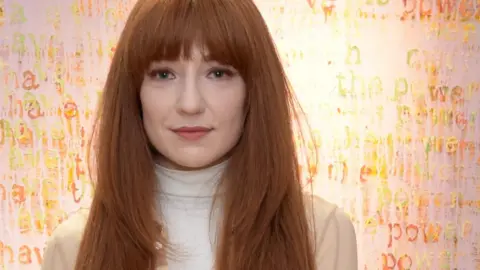Nicola Roberts refuses to support government's online hate bill
 Getty Images
Getty ImagesGirls Aloud star Nicola Roberts says she refused the government's request to endorse its Online Safety Bill, due to "loopholes" in the legislation.
The singer said was asked to "champion" the bill after suffering abuse, harassment and online stalking.
But she said the draft bill does not do enough to stop people who've been banned from setting up new accounts.
The government said the legislation would tackle anonymous accounts without imposing a "blanket ban" on anonymity.
"I am unconcerned with chasing the rabbit," she said in a statement. "I would rather just fill the hole."
Roberts said she had been invited to discuss the bill by the Department for Digital, Culture, Media and Sport (DCMS) two weeks ago.
Although the meeting was private, she said the racist abuse aimed at Marcus Rashford, Jadon Sancho and Bukayo Saka after Sunday's Euro 2020 final on Sunday strengthened her conviction that the legislation needed to be tougher.
"The online racism we have seen since last night's England game targeted at, in particular, a 19-year-old is despicable," she said.
"Regardless of whether an abuser's account is blocked or taken down, perpetrators make the time to start another and start again. It highlights why those loopholes need to be filled and this has to stop!"
In response, a DCMS spokesperson said anonymous accounts were important for certain groups of people, including those "exploring their sexuality or suffering domestic abuse".
However, they added, the proposed bill would force social media companies to meet a duty of care, "which will mean stopping repeat offenders from opening new accounts and working with the authorities to make it easier to find people who set up accounts anonymously to abuse others".
The Online Safety Bill, which was two years in the making, was announced in the Queen's Speech this May.
It says social media firms will have to remove harmful content quickly or potentially face multi-billion-pound fines.
The legislation is "especially" geared at keeping children safe and covers a huge range of content to which children might fall victim - including grooming, revenge porn, hate speech, images of child abuse and posts relating to suicide and eating disorders.
But it also covers content that promotes terrorism, disinformation, racist abuse and pornography.
The government says "democratically important" content should be preserved - including posts promoting or opposing government policy or a political party ahead of a vote, election or referendum.
Roberts said she was asked to lend her support, alongside other public figures, in the hope of the bill becoming law.
However, after reading the draft legislation, she explained she "couldn't support the bill until something more concrete was developed".
"It would be unproductive and a slap in the face for me to support something that ultimately was still contributing to countless people experiencing abuse online," she added.
The singer, who won the first series of The Masked Singer last year, urged fans to write to their MPs demanding a tougher solution.
"It's not the overall fix in combating why people are hateful," she said. "But it's a piece of the puzzle that helps keep people safer online."
'Afraid to walk the dog'
Roberts suffered online abuse and stalking at the hands of an ex-boyfriend, who sent her 3,000 messages from 35 fake Twitter accounts after they split in 2008.
They included threats to stab and burn her, leaving the star afraid to leave her windows open at night, or take her dog for a walk.
"When someone plants vicious seeds you just imagine every possible outcome," she told the Sunday Times.
Her stalker was given a lifetime restraining order in 2017, but breached the order and started following her on Instagram. The CPS initially planned to prosecute but dropped the case in 2018, calling it "trivial" as the abuse happened online.
They later apologised to Roberts, saying: "We fully appreciate the impact stalking and harassment has on victims and we take prosecuting these cases extremely seriously."
In October 2019, the singer voluntarily had the £1.25m house where she was harassed repossessed by the bank, after it failed to sell for just £825,000 on the open market.
"I had been trying to sell the house for years, and was so unhappy there that I decided to take the hit financially in order to move on and find a new property away from the bad memories," she said at the time.
Roberts currently works with the charity Women's Aid in an attempt to prevent other women suffering the same sort of abuse she did.

Follow us on Facebook, or on Twitter @BBCNewsEnts. If you have a story suggestion email [email protected].
